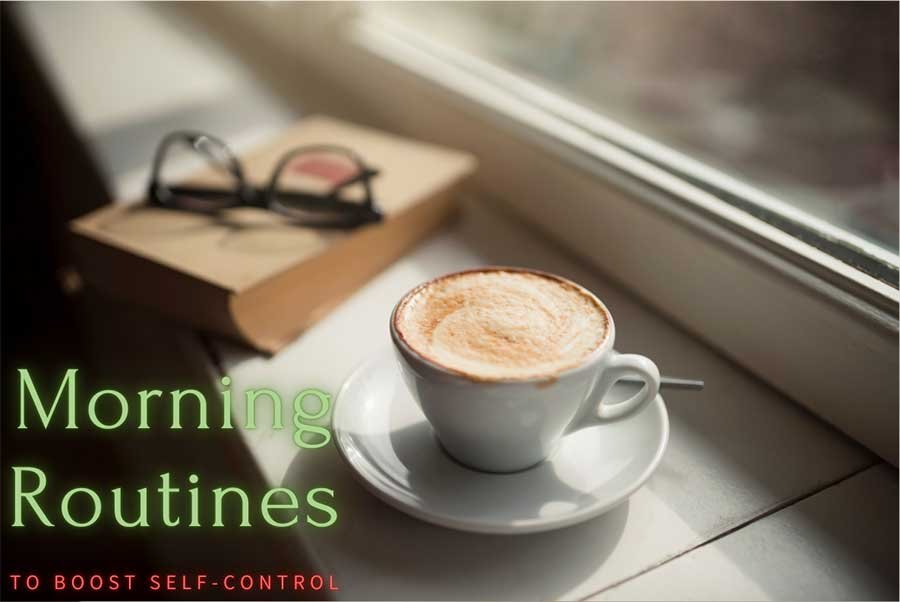
Morning Routines to Boost Self-Control: Starting Your Day with Intentional Power
The alarm blares. Your hand instinctively reaches for the snooze button. Or perhaps, before your feet even hit the floor, you’re already scrolling through social media, bombarded by external stimuli. How you begin your day sets a powerful precedent for the hours that follow, deeply influencing your willpower, focus, and overall ability to make disciplined choices. In a world of endless distractions and instant gratification, cultivating strong self-control is paramount to achieving your goals and living intentionally.

Self-control, often referred to as willpower or self-regulation, is the ability to resist short-term temptations in favor of long-term goals. It’s the inner strength that allows you to choose what you want most over what you want now. While it can feel like a finite resource that depletes throughout the day, research suggests that you can actively replenish and strengthen it through consistent practices, particularly those integrated into your morning routine. Many successful individuals understand this, and their mornings often look very different; exploring the morning routines of millionaires: what they do differently reveals a common thread of intentionality and self-discipline.
This article will explore why your morning is a prime opportunity to supercharge your self-control and outline practical, actionable morning routine elements that can help you build this vital skill, empowering you to make disciplined choices throughout your entire day.
The Morning Advantage: Why It Matters for Self-Control
Your brain is remarkably receptive and relatively free of decision fatigue in the early hours. This “morning advantage” makes it the perfect time to build self-control for the day ahead:
- Undepleted Willpower: Self-control is often likened to a muscle. In the morning, after a night’s rest, your willpower “muscle” is strongest and freshest.
- Reduced Decision Fatigue: By front-loading positive habits, you reduce the number of small decisions you have to make later in the day, conserving mental energy for more critical choices.
- Setting the Tone: A disciplined start creates positive momentum, influencing your choices and actions throughout the day. It primes your brain for focus and intentionality.
- Fewer Distractions: Early mornings often offer a quieter, less interrupted window for focused self-care and planning before the demands of the day kick in.
By intentionally structuring your mornings, you’re not just creating habits; you’re actively training your brain to be more disciplined, resilient, and effective. In fact, many of these elements contribute to 8 morning routines that lead to a healthier life overall.
Morning Routines to Boost Self-Control: Key Elements & How to Implement Them
The goal is not to create an impossibly long routine, but to weave in a few key habits that reinforce self-control.
1. Consistent Wake-Up Time (Even on Weekends)
This foundational habit regulates your body’s natural circadian rhythm, influencing energy and mood.
- The Habit: Choose a consistent wake-up time and stick to it, even on your days off. Avoid the snooze button, which disrupts sleep cycles and starts your day with a micro-act of indiscipline.
- Why it Boosts Self-Control: Waking up consistently trains your body’s internal clock, leading to more natural energy and less reliance on willpower to get out of bed. It’s a foundational act of self-mastery.
- Real-Life Example: I used to let my wake-up time slide on weekends, making Monday mornings feel brutal. By committing to the same wake-up time every day, my body naturally adjusted. I found I needed less caffeine and felt more alert from the moment I woke up, which translated into more focus for my morning tasks.
2. Immediate Hydration
Simple, yet profoundly impactful for physical and mental clarity.
- The Habit: Keep a glass of water by your bedside and drink it immediately upon waking.
- Why it Boosts Self-Control: Your body is dehydrated after sleep, which can lead to sluggishness and brain fog. Hydrating immediately kickstarts your metabolism and supports mental clarity, making it easier to engage in other self-control demanding tasks. It’s a small, healthy “win” first thing.
- Real-Life Example: Sarah struggled with morning grogginess. Adding a large glass of water as her first morning act, even before coffee, made a noticeable difference. She felt more awake and less likely to hit snooze or mindlessly scroll, as her brain felt clearer.
3. Mindful Movement (Even 5 Minutes)
Physical activity, even light, signals discipline and energizes the body.
- The Habit: Engage in some form of physical activity, however brief: stretching, a few push-ups, a quick walk, or even just dancing to a song. The goal is to move your body intentionally.
- Why it Boosts Self-Control: Exercise releases endorphins, reduces stress hormones, and improves cognitive function. Starting your day with a physical challenge, however small, builds self-efficacy – the belief in your ability to succeed.
- Real-Life Example: Mark committed to 5 minutes of stretching and light yoga every morning. On days he didn’t feel like it, he’d tell himself, “Just 5 minutes.” This minimal commitment built consistency. He found that after this small effort, he felt more energized and disciplined for tougher tasks later in the day.
4. Limit Morning Screen Time (Especially Social Media/Email)
Protect your precious morning mental space from external demands and distractions.
- The Habit: Keep your phone on airplane mode or in a different room until your core morning routine is complete. Resist the urge to check emails, news, or social media for the first 30-60 minutes.
- Why it Boosts Self-Control: This prevents decision fatigue and impulse reactivity. You decide what you want to do first, rather than reacting to external stimuli. It sets a boundary for your mental energy, which is a powerful form of self-control. This mirrors advice given to those pursuing home-based business opportunities where digital discipline is vital.
- Real-Life Example: Emily used to wake up and immediately check work emails, causing immediate stress and derailing her peaceful morning. By putting her phone in her dresser drawer until after her mindful routine, she regained control of her mornings and felt significantly less anxious. This mindful approach can contribute to overall mental clarity, as described in my 30-minute mental clarity morning routine.
5. Set Daily Intentions or Prioritize One “Big Rock”
Prime your mind for focus and purposeful action.
- The Habit: Take 2-5 minutes to identify 1-3 key tasks or intentions for the day. This isn’t a full to-do list, but rather what you must accomplish or how you want to show up.
- Why it Boosts Self-Control: It shifts your mindset from reactive to proactive. You consciously choose what to focus on, making it easier to resist distractions that don’t align with those intentions.
- Real-Life Example: David, a project manager, struggled with feeling overwhelmed by his daily tasks. He started picking his single most important “big rock” for the day each morning. Knowing his top priority made it easier to say “no” to less important requests and push through distractions, as he had a clear target for his limited willpower. This simple practice contributed to my morning routine for calm, clarity, and focus.
6. Mindful Reflection (Gratitude or Journaling)
Cultivate a positive and aware mindset.
- The Habit: Spend a few minutes practicing gratitude (listing 3 things you’re thankful for) or quick journaling (brain dumping thoughts, setting intentions).
- Why it Boosts Self-Control: Gratitude shifts your focus to abundance and positivity, countering negativity bias. Journaling clears mental clutter, allowing for greater clarity and intentional decision-making. These practices enhance emotional regulation, which supports sustained self-control.
- Real-Life Example: Chloe used to wake up and immediately think about her stressors. By starting with 3 things she was grateful for, she reprogrammed her initial thoughts. This small shift in focus made her feel more positive and capable, making it easier to stick to her disciplined habits.
Sustaining Your Self-Control: Beyond the Morning
While morning routines are powerful catalysts, maintaining self-control throughout the day requires ongoing awareness:
- Be Patient: Building self-control is like training a muscle. Some days will be easier than others.
- Self-Compassion: If you slip up, don’t beat yourself up. Acknowledge it, learn from it, and get back on track tomorrow.
- Environment is Key: Continue to design your environment to support your goals.
- Practice Active Recovery: Just as your willpower gets depleted, schedule intentional breaks and recharge moments throughout the day.
By intentionally crafting your morning routine, you’re not just starting your day; you’re actively building the mental and emotional strength to navigate challenges, resist impulses, and consistently choose actions that lead to the life you truly desire. Your disciplined mornings become the foundation for a life lived with purpose and intentional power.
20 Empowering Quotes on Morning Routines, Self-Control, and Discipline:
- “Rule your mind or it will rule you.” – Horace
- “The first and best victory is to conquer self.” – Plato
- “How you start your day is how you live your day. How you live your day is how you live your life.” – Louise Hay
- “Discipline is the bridge between goals and accomplishment.” – Jim Rohn
- “Suffer the pain of discipline or suffer the pain of regret.” – Jim Rohn
- “The only way to do great work is to love what you do.” – Steve Jobs (Even in your morning routine)
- “We are what we repeatedly do. Excellence, then, is not an act, but a habit.” – Aristotle
- “Early to bed and early to rise, makes a man healthy, wealthy, and wise.” – Benjamin Franklin
- “Your habits determine your future.” – Jack Canfield
- “The secret of getting ahead is getting started.” – Mark Twain (Start with your morning).
- “Motivation gets you started. Discipline keeps you going.” – Jim Ryun
- “Give me six hours to chop down a tree and I will spend the first four sharpening the axe.” – Abraham Lincoln (Sharpen your ‘axe’ in the morning).
- “The only discipline that lasts is self-discipline.” – Bum Phillips
- “By failing to prepare, you are preparing to fail.” – Benjamin Franklin (Prepare your self-control in the morning).
- “Your routine determines your destiny.” – Darren Hardy
- “What you do every day matters more than what you do once in a while.” – Gretchen Rubin
- “The hardest part is starting. Once you get that out of the way, the rest is easy.” – Unknown (Applies to morning routines).
- “Don’t break the chain.” – Jerry Seinfeld (On consistency).
- “The moment you give up, is the moment you let someone else win.” – Kobe Bryant (Stay disciplined).
- “If you want to make an easy job seem hard, just keep putting off doing it.” – Olin Miller (Morning routine prevents putting off).
Picture This
Imagine your self-control as a battery. Throughout the day, every decision you make, every temptation you resist, drains a bit of its power. If you start your day with an already low battery (snoozing, chaotic rush, immediate distractions), you’ll struggle to make disciplined choices by midday. Now, picture your morning routine as a powerful charging station. Each intentional habit – a consistent wake-up, immediate hydration, mindful movement, protected screen-free time – is a plug that recharges your self-control battery. You start your day at 100%, fully powered and ready to confidently navigate the decisions and demands that come your way, sustaining your willpower throughout the day.
Share This Article
Did these morning routine ideas inspire you to boost your self-control? Share this article with friends, family, or on social media to help others start their days with intentional power and achieve their goals!
Disclaimer
This article is intended for informational purposes only and provides general guidance on morning routines and self-control. Individual results may vary based on effort, personal circumstances, and underlying psychological factors. It is not a substitute for professional advice, diagnosis, or treatment for specific challenges related to self-control, sleep disorders, or mental health conditions. If you are experiencing significant or persistent difficulties, please consult with a qualified mental health professional.






